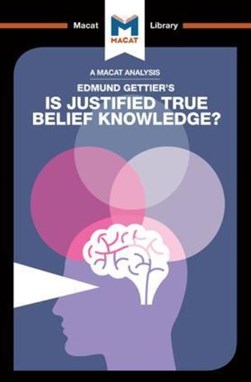-
BROWSE 1000s OF BOOKS IN STOCK
-
FREE DELIVERY ON ORDERS OVER €10
-
PRE-ORDER OBSESSED BY JOHNNY SEXTON
An Analysis of Edmund Gettier's Is Justified True Belief Knowledge?
PAPERBACK
Series: See all books in this series
For 2,000 years, the standard philosophical model of knowledge was that it could be defined as a justified true belief. According to this way of thinking, we can know, for example, that we are human because [1] we believe ourselves to be human; [2] that belief is justified (others treat us as humans, not as dogs); and [3] the belief is true. This definition, which dates to Plato, was challenged by Edmund Gettier in one of the most influential works of philosophy published in the last century - a three page paper that produced two clear examples of justified true beliefs that could not, in fact, be considered knowledge. Gettier's achievement rests on solid foundations provided by his mastery of the critical thinking skill of analysis. By understanding the way in which Plato - and every other epistemologist - had built their arguments, he was able to identify the relationships between the parts, and the assumptions that underpinned then. That precise understanding was what Gettier required to mount a convincing challenge to the theory - one that was bolstered by a reasoning skill that put his counter case pithily, and in a form his colleagues found all but unchallengeable.
€9.43

28 Reward Points
In stock online
Extended Range: Delivery in 2-3 working days
Any purchases for more than €10 are eligible for free delivery anywhere in the UK or Ireland!
For 2,000 years, the standard philosophical model of knowledge was that it could be defined as a justified true belief. According to this way of thinking, we can know, for example, that we are human because [1] we believe ourselves to be human; [2] that belief is justified (others treat us as humans, not as dogs); and [3] the belief is true. This definition, which dates to Plato, was challenged by Edmund Gettier in one of the most influential works of philosophy published in the last century - a three page paper that produced two clear examples of justified true beliefs that could not, in fact, be considered knowledge. Gettier's achievement rests on solid foundations provided by his mastery of the critical thinking skill of analysis. By understanding the way in which Plato - and every other epistemologist - had built their arguments, he was able to identify the relationships between the parts, and the assumptions that underpinned then. That precise understanding was what Gettier required to mount a convincing challenge to the theory - one that was bolstered by a reasoning skill that put his counter case pithily, and in a form his colleagues found all but unchallengeable.

28 Reward Points
Any purchases for more than €10 are eligible for free delivery anywhere in the UK or Ireland!
€9.43

28 Reward Points
Any purchases for more than €10 are eligible for free delivery anywhere in the UK or Ireland!
Series: See all books in this series
Product Description
For 2,000 years, the standard philosophical model of knowledge was that it could be defined as a justified true belief. According to this way of thinking, we can know, for example, that we are human because [1] we believe ourselves to be human; [2] that belief is justified (others treat us as humans, not as dogs); and [3] the belief is true. This definition, which dates to Plato, was challenged by Edmund Gettier in one of the most influential works of philosophy published in the last century - a three page paper that produced two clear examples of justified true beliefs that could not, in fact, be considered knowledge. Gettier's achievement rests on solid foundations provided by his mastery of the critical thinking skill of analysis. By understanding the way in which Plato - and every other epistemologist - had built their arguments, he was able to identify the relationships between the parts, and the assumptions that underpinned then. That precise understanding was what Gettier required to mount a convincing challenge to the theory - one that was bolstered by a reasoning skill that put his counter case pithily, and in a form his colleagues found all but unchallengeable.
Product Details
ISBN9781912127498
FormatPAPERBACK
PublisherROUTLEDGE (15 July. 2017)
No. of Pages100
Weight110
Language English
Dimensions 198 x 136 x 6

